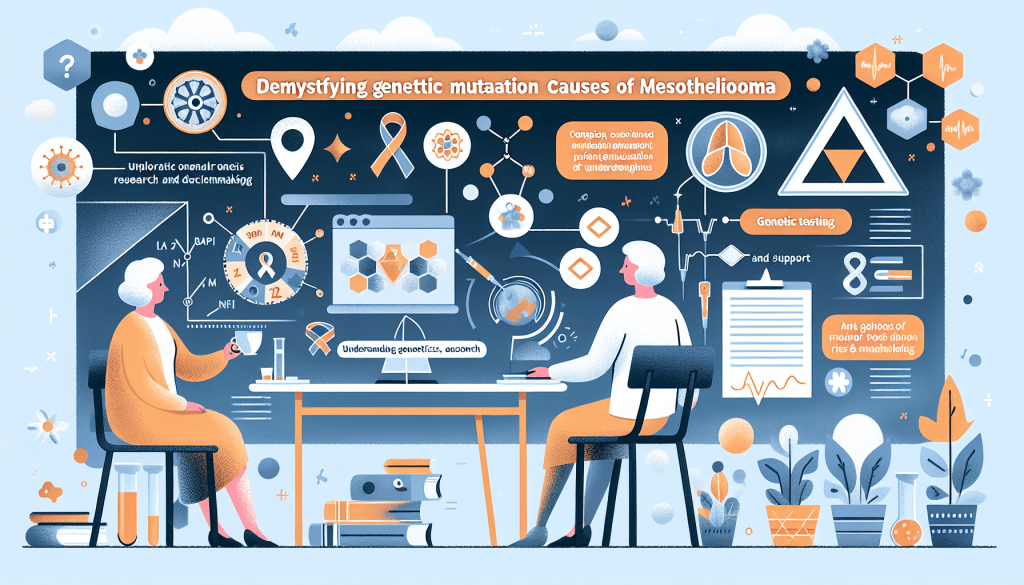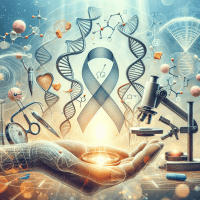Mesothelioma Genetic Mutation Causes Demystified
Hello, I’m Alex, an oncology patient educator and advocate with years of experience supporting patients facing mesothelioma. Today, I share my personal journey alongside the latest research insights into mesothelioma genetic mutation causes. This topic hits close to home and it is my mission to provide clear, empathetic, and actionable information for every reader confronting this diagnosis.

Mesothelioma remains one of the most challenging cancers to understand and treat. While asbestos exposure is the primary known cause, recent studies emphasize an intricate link with genetic mutations that may predispose individuals to the disease. I firmly believe in empowering patients with knowledge to make informed decisions about their health and treatment. In this comprehensive guide, I explore key genetic factors and discuss the role of genetic testing. My goal is to deliver both comfort and clarity, backed by current research from respected sources such as the National Cancer Institute (NCI), American Cancer Society, and the Mesothelioma Applied Research Foundation.
Understanding the Genetic Landscape of Mesothelioma
Genetic mutations play a critical role in the development of many cancers, including mesothelioma. In my practice, I have seen firsthand how knowledge of these mutations can empower patients and families. Specifically, mutations in genes such as BAP1, NF2, and LATS2 have been studied extensively.
The Role of BAP1 Gene Mutations
The BAP1 gene is one of the most important in the context of mesothelioma, often cited when discussing genetic predisposition. Research indicates that individuals with a family history of BAP1 mutations may have an elevated risk for mesothelioma. This genetic vulnerability can influence both the timing of disease onset and treatment responsiveness. In my consultations, I often stress the value of genetic testing for mesothelioma risk assessment, especially for patients with a significant family history of cancer.
NF2 and LATS2 Gene Alterations
Alongside BAP1, mutations in the NF2 and LATS2 genes also contribute significantly to mesothelioma development. These mutations may alter cell growth regulation and tumor suppression pathways, leading to uncontrolled cell proliferation. When discussing mesothelioma genetic mutations with patients, I highlight how subtle changes in these genes can affect the overall risk and inform personalized treatment strategies. The emerging evidence is promising, as it opens avenues for targeted therapies that focus on these specific genetic alterations.
It is crucial to remember that while these genetic factors are important, they are just part of a larger puzzle that includes environmental exposures and lifestyle. By comprehensively understanding the interplay of these elements, we can achieve a more nuanced approach to mesothelioma care.
Mesothelioma Genetic Testing: Empowering Decisions
In my years working with mesothelioma patients, I have seen how genetic testing can be a turning point in managing the disease. Such testing not only helps in identifying genetic risk factors for mesothelioma development but also assists in crafting personalized treatment plans. Currently, tests focus on a range of genes to establish risk profiles, including some of the key players we discussed earlier.
The procedure for mesothelioma genetic testing involves a simple blood test or tissue biopsy, followed by advanced genomic analysis. This process provides clear insights into the mutation status of genes like BAP1, NF2, and LATS2. I always recommend that my patients seek guidance from specialists who are well-versed in genomic medicine to interpret these results meaningfully. Knowing the specifics of one’s genetic makeup can sometimes be a heavy burden, but it also opens the door to tailored medical interventions and improved long-term management.
Genetic Risk Factors and Patient Stories
I recall a particular case (anonymized for privacy) where a patient with a subtle BAP1 mutation successfully enrolled in a clinical trial for a targeted therapy. Their story, along with many others, underlines the transformative potential of understanding genetic risk factors for mesothelioma development. These clinical insights, grounded in real-life experiences, reinforce the importance of advocating for genetic testing as a standard practice in mesothelioma care.
Visualizing Mesothelioma: A Medical Diagram
Visual aids can simplify complex medical data, and I find that they are incredibly valuable. Below, you will see a diagram that accurately illustrates mesothelioma staging and treatment options. The medically accurate diagram helps in understanding how genetic mutations may affect cancer progression and responses to therapies.

Actionable Steps for Patients and Caregivers
Knowledge is a powerful tool in the battle against mesothelioma. If you or a loved one has been diagnosed with mesothelioma, consider these actionable steps:
- Discuss the possibility of genetic testing with your healthcare provider to better understand your risk profile.
- Review family history comprehensively to identify potential genetic predispositions.
- Educate yourself on mesothelioma genetic mutations by consulting authoritative sources such as the NCI, American Cancer Society, and the Mesothelioma Applied Research Foundation.
For more detailed insights, visit our Mesothelioma Treatment Options page. Additionally, our Emotional Support Resources for Mesothelioma Caregivers section offers compassionate advice for those navigating the challenging emotional landscape of a mesothelioma diagnosis.
These steps ensure that you are not only better informed but also more proactive in seeking the support and interventions necessary to manage this condition.
Transparency and Support
In the spirit of full transparency, I want to emphasize that while this content is provided for informational and educational purposes, it is not a substitute for professional medical advice. I remain deeply committed to offering support based on both personal experience and validated research. My dedication to the mesothelioma community is driven by a sincere intent to empower and inform, not to promote any commercial legal or medical services. Any commercial service mentions within our site are clearly disclosed after comprehensive informational content.
This approach ensures that you receive unbiased, compassionate guidance from someone who truly understands the challenges of navigating mesothelioma care. It is my hope that you find both comfort and clarity in these insights as you navigate your own journey or support a loved one.
Citing Authoritative Sources
All of the information provided in this post is current as of June 2024 and reflects the latest research findings and clinical guidelines. For further reading and detailed studies, I encourage you to review publications and guidelines from esteemed organizations:
- National Cancer Institute (NCI)
- American Cancer Society
- Mesothelioma Applied Research Foundation
These sources offer additional depth and empirical support to the discussions presented in this article.






